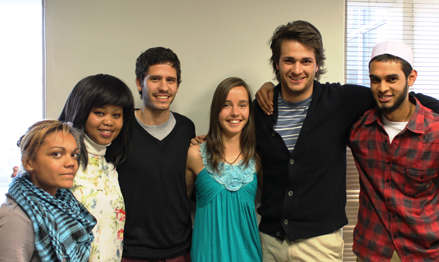Latest News Archive
Please select Category, Year, and then Month to display items
12 January 2024
|
Story Nonsindiswe Qwabe
|
Photo Sonia Small
 Since joining the UFS in 2008, Dr Grey Magaiza has worked extensively on approaches that can foster the socio-economic transformation of societies.
Since joining the UFS in 2008, Dr Grey Magaiza has worked extensively on approaches that can foster the socio-economic transformation of societies.
“The future should be one where communities can decide on their development agenda and futures. That’s the most important for me.” Dr Grey Magaiza, Deputy Director of the Centre for Gender and Africa Studies (CGAS) and Head of the Community Development programme on the Qwaqwa Campus, is passionate about capacitating communities to be agents of change and advancement. His vision for the future emphasises the empowerment of communities to take charge of their development by actively participating in decision making and the implementation of development projects that can improve their lives.
Since joining the UFS in 2008, Dr Magaiza has worked extensively on approaches that can foster the socio-economic transformation of societies. Over the years, he has crafted his research speciality into one that he is most proud of – being an interdisciplinary scientist immersed in the development of communities.
“I’m in a fortunate position of researching what I like. I say ‘fortunate’, because I’ve taken the time to understand what I’m passionate about, which is the overall field of rural livelihoods and livelihood futures – in short, community development. My research starts from an engaged university, understanding the elements that a university must use to enhance transformation and relevance to its immediate community in terms of development.”
One of the ways he has done this is by looking at social entrepreneurship as a development approach for young people in a rural setting. Through workshops with non-profit and civic organisations in Qwaqwa, Dr Magaiza has been helping these organisations to map out their needs and actively meet them through the involvement and support of external role players.
“We understand that communities are part of the national development agenda, but even that national agenda respects community knowledge and intentions and allows communities to shape their identity. A critical enabler of this is community organising. You bring back the capacity in communities to have dialogues on issues affecting them as spaces for engagement, knowledge exchange, and for people to just talk about their way forward.”
By enabling communities to define their development agenda, they can address their specific needs, challenges, and aspirations, he said. “When I look at livelihood futures, it’s quite an exciting aspect of my work – it’s like looking into a fortune tellers’ globe, because you’re not deciding for communities what they should do, but the communities themselves take those decisions.”
Students take part in prestigious programme at Stanford University
2013-08-05
|
 |
Ready for Stanford. From the left are: Patricia Mapipi, SinazoMabunu, Claudio Carlos, Elzahn van der Westhuizen, Stefan van der Westhuizen and Zakariyya Patel.
Photo: Jerry Mokoroane
05 August 2013 |
At the end of August 2013 six Kovsies will depart for Stanford Sophomore College in San Francisco, USA, to take part in a prestigious residential programme. The programme stems from a key partnership between the UFS and Stanford University.
This programme involves the most talented second-year undergraduate students from both the UFS and Oxford universities joining the Stanford Sophomore College.These students spend over two weeks during the USA summer recess engaged in a programme which concentrates on the academic studying of innovative and multidisciplinary topics.
The Kovsies students selected for the 2013 programme are: Patricia Mapipi and Sinazo Mabunu from the Faculty of the Humanities; Claudio Carlos and Elzahn van der Westhuizen from the Faculty of Economic and Management Sciences; and Stefan van der Westhuizen and Zakariyya Patel from the Faculty of Health Sciences.